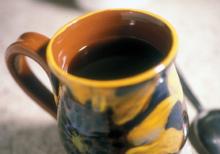Whether coffee is good or bad for health is a frequent debate in the media, fueled by apparently conflicting studies suggesting the plethora of bioactive chemicals in the popular brew could either raise or lower cancer risk.
Now, an analysis by Cambridge scientists has suggested that while coffee is not associated with enhanced overall risk of non–digestive system cancers among people genetically predicted to drink more of it,
, although this might be explained by a tendency for drinking it warm or hot, the study in the journal Clinical Nutrition suggested.
Regular coffee drinking has been linked to a slightly lower risk of all-cause mortality. However, it remains unclear whether coffee consumption is associated with a lower risk of dying from cancer.
Hotly debated
In 2016, a working group of international scientists convened by the International Agency for Research on Cancer (IARC) found no conclusive evidence for a carcinogenic effect of drinking coffee. However, the experts did find that drinking very hot beverages was a probable cause of esophageal cancer, making “the temperature, rather than the drinks themselves” the most likely cause, according to the organization’s director.
This latest study concurred. “We provide strong evidence for a causal relationship which is large in magnitude (threefold) and consistent across sensitivity analyses and in a replication study,” it stated.
The Cambridge researchers, assisted by colleagues at the Karolinska Institutet in Stockholm and Bristol Medical School, conducted a Mendelian randomization study to investigate causal associations between coffee consumption and 22 site-specific cancers using data of individuals of European descent in the UK Biobank.
They reported “no strong evidence supporting a causal relationship between genetically-predicted coffee consumption and the majority of cancers studied” (odds ratio [OR], in the main analysis 1.05, 95% confidence interval [CI], 0.98-1.14, P = .183), and remained without association after adjustments for predicted BMI, smoking, or alcohol consumption.
However, genetically predicted coffee consumption was linked to an increased risk of digestive system cancer (OR, 1.28, 95% CI, 1.09-1.51, P = .003), and the risk was largely attributed to “a strong association with esophageal cancer” (OR, 2.79, 95% CI, 1.73-4.50, P = 2.5x10-5). This risk association remained persistent after adjustment for confounders, the researchers said.
Coffee or tea?
Further analysis of the data found that increased risk of esophageal cancer was consistently associated with genetically predicted coffee consumption by individuals with a preference for warm and hot drinks. Among this group, a similar esophageal cancer risk profile among those who reported drinking one to three cups of coffee a day and those who said they did not drink coffee was most likely due to a high prevalence of tea drinking, the study authors said.
“It is, therefore, plausible that a carcinogenic effect of coffee relates to thermal injury broadly, rather than being specific to coffee or its constituents,” said the scientists, who highlighted that this was also pointed out by the IARC in its statement 6 years ago.
Genetically predicted coffee consumption was also found to be associated with increased risk of multiple myeloma (OR, 2.25, 95% CI, 1.30-3.89, P = .004) and reduced ovarian cancer risk (OR, 0.63, 95% CI, 0.43-0.93, P = .020).
The authors concluded there was “evidence for coffee consumption being causally associated with risk of esophageal cancer, with some evidence this is related to a temperature effect.” Otherwise, “our results do not support a linear causal association with the majority of cancer types studied, other than limited evidence for harmful and protective associations with multiple myeloma and ovarian cancers respectively.”
Further studies were needed to investigate “the possible mechanisms of coffee consumption in esophageal carcinogenesis,” they said.
A version of this article first appeared on Medscape UK.


